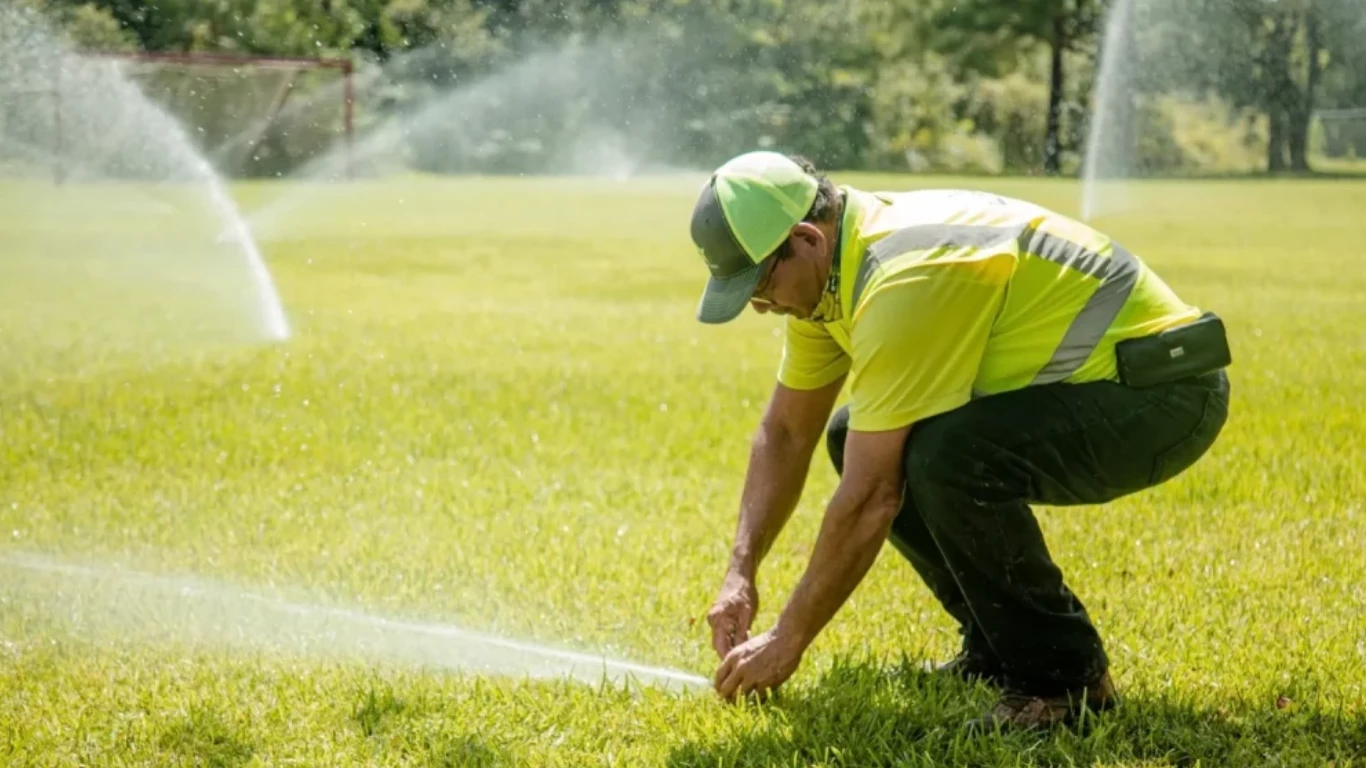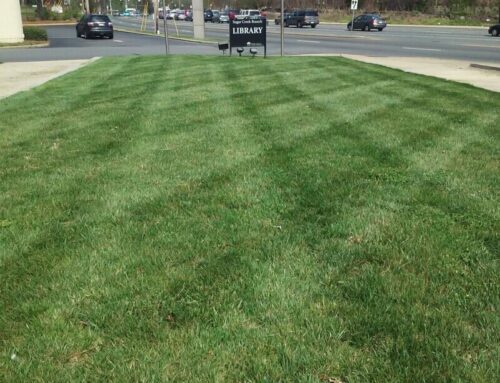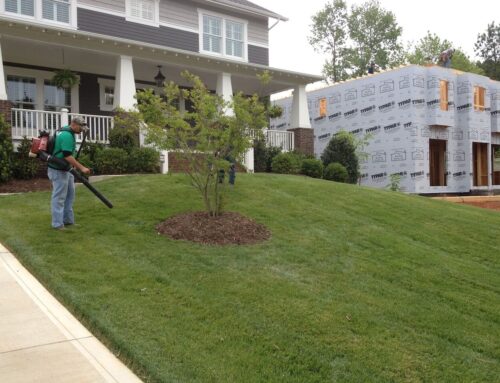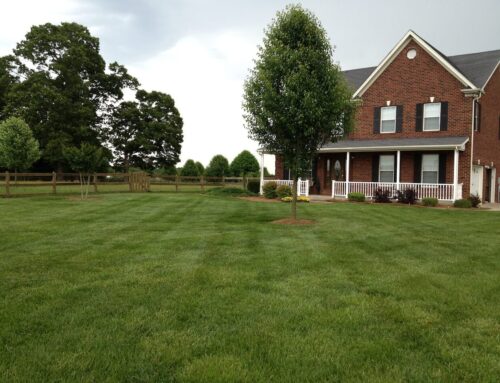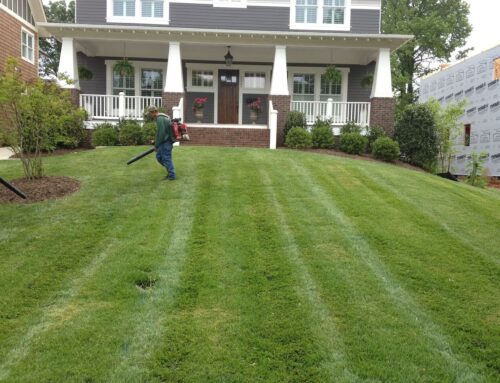Irrigation systems are the unsung heroes in the health of your landscape, especially for your bushes and trees. These vital green assets need more than just sunlight; they require a consistent and adequate water supply to thrive. However, when your irrigation system runs into trouble, it’s not just your grass that suffers—your bushes and trees are at risk too. That’s where professional irrigation repair comes in.
Ensuring your irrigation system is functioning optimally protects your landscape investments by delivering the right amount of water, at the right time. It prevents the stress, diseases, and growth issues that come from both under-watering and over-watering.
So, whether you’re noticing dry patches, over-saturated soil, or just want to keep your system in top condition, remember that a little attention to your irrigation system now can save your bushes and trees a lot of stress later. Let’s keep your green space lush and healthy together!
What are common signs of damage to bushes and trees from irrigation systems?
Common signs of damage to bushes and trees from improper irrigation include:
- Overwatering
- Yellowing Leaves: Excessive water can lead to yellow, wilting leaves as roots become saturated and unable to function correctly.
- Soft, Spongy Wood: Overwatered trees may exhibit soft, spongy wood near the base, indicating root rot.
- Leaf Drop: Excess water can cause premature leaf drop or thinning foliage as the plant struggles to maintain its normal processes.
- Underwatering
- Dry, Brittle Leaves: Leaves may appear dry and brittle and curl or become scorched, especially during hot, dry weather.
- Stunted Growth: Insufficient water can lead to slowed or stunted growth as the plant needs more resources to expand.
- Leaf Scorching: Edges of leaves might appear brown or burnt due to inadequate hydration.
- Root Issues
- Visible Roots: Over or underwatering can expose roots, either from soil erosion or from the plant trying to access water.
- Weak Structure: Plants with damaged roots due to poor watering practices are often unstable and have weakened structural integrity.
- Fungal Diseases
- Mold or Mildew: Excessive moisture can create an environment conducive to fungal growth, such as mold or mildew, which typically appears on the leaves or base of the plant.
To prevent these issues, adjusting irrigation practices based on weather conditions, soil type, and specific plant needs is essential. Regular monitoring and maintenance of the irrigation system can also help detect and resolve issues before they lead to severe damage.
How can improper irrigation repair negatively impact the health of bushes and trees?
Improper irrigation repair can significantly impact the health of bushes and trees in several detrimental ways:
- Water Stress: Both overwatering and underwatering caused by faulty irrigation can lead to water stress. Overwatering can suffocate plant roots by limiting oxygen availability, leading to root rot and fungal infections. On the other hand, underwatering can cause dehydration, reduce the plant’s ability to photosynthesize, weaken growth, and increase susceptibility to pests and diseases.
- Nutrient Imbalance: Improper watering can leach essential nutrients from the soil, making them unavailable to plants or can prevent plants from absorbing nutrients effectively. This can lead to nutrient deficiencies, such as discolored leaves, stunted growth, and poor overall plant health.
- Increased Disease Susceptibility: Excessive moisture from poor irrigation practices can create an environment conducive to fungal and bacterial diseases, which thrive in wet conditions. Conversely, stressed and weakened plants from too little water are more vulnerable to diseases and pests.
- Root Damage: Incorrect irrigation repair can lead to water distribution that is too shallow or too deep, which affects root development. Shallow watering encourages surface roots to be more susceptible to drying out, while deep watering without sufficient drainage can cause roots to rot.
- Environmental Stress: When irrigation systems are not repaired correctly, they can fail to adjust to changing environmental conditions. This can exacerbate the effects of droughts or rainy periods, leading to further stress and damage to plants.
Effective irrigation repair and management ensure that water is delivered that matches the specific needs of each plant type and the local climate, promoting healthy growth and minimizing stress. Regular checks and maintenance of the irrigation system are crucial for the ongoing health of garden vegetation.
What techniques can be used to prevent damage to vegetation during irrigation repair?
To prevent damage to vegetation during irrigation repair, several techniques can be employed to ensure the health and safety of plants:
- Pre-Assessment of the Area: Before beginning any repair work, assess the area for sensitive vegetation and plan the repair process to minimize physical disturbance. Identify the root zones of trees and large bushes to avoid damage during digging or trenching.
- Use of Gentle Equipment: Choose tools and repair equipment less likely to harm plant roots and above-ground vegetation. For example, using hand tools in tight spaces can prevent the extensive root damage that might occur with larger machinery.
- Proper Water Management: Before and after repairs, ensure that the irrigation system provides adequate water distribution that matches the needs of the specific plants in the area. If the system is down for an extended period, this might involve temporary watering solutions.
- Root Protection Measures: When working near trees or large bushes, implement root protection measures such as mulching around the base or using root barriers during digging. This helps to cushion the impact and preserve vital root structures.
- Timely Repairs: Conduct repairs during times of the year when plants are least vulnerable, such as during dormant seasons for many species. Avoiding repairs during peak growth periods reduces stress on the vegetation.
- Restoration Post-Repair: After completing repairs, restore the area by replanting any uprooted vegetation and applying soil amendments if necessary to enhance recovery. Ensure the repaired system is tested and adjusted to prevent over or under-watering, which can stress plants.
- Consultation with Experts: If unsure about the potential impact on vegetation, consult with a horticulturist or a landscape expert to get recommendations on how to proceed safely with minimal impact on the plants.
Employing these techniques can significantly reduce the risk of damaging vegetation during irrigation system repairs, ensuring that your landscape remains healthy and vibrant.
Why is it essential to address irrigation system issues promptly to safeguard bushes and trees?
Addressing irrigation system issues promptly is essential for safeguarding bushes and trees for several reasons:
- Prevention of Water Stress: Both overwatering and underwatering can cause significant stress to plants, weakening health and reducing vigor. Immediate repair of irrigation issues helps maintain the optimal moisture balance in the soil, ensuring plants have the necessary water to support growth and sustain vital functions.
- Root Health: Healthy root systems are critical for plant survival. A practical and well-maintained irrigation system encourages profound root growth, which enhances stability and drought resistance. Prompt repairs prevent conditions that lead to root rot or dehydration, which can be fatal to plants.
- Disease and Pest Reduction: Excessive moisture from a malfunctioning irrigation system can create environments conducive to fungal diseases and attract pests that prey on weakened plants. Quick action to fix leaks or improper drainage helps minimize these risks, keeping plants robust and more capable of resisting disease and pests.
- Resource Efficiency: Efficient water use is better for the environment and your garden’s overall health. An irrigation system that operates correctly without leaks or misalignment prevents water wastage, ensuring that all parts of your garden receive the right amount of water without excess.
- Long-Term Plant Health: Consistent care and maintenance of irrigation systems contribute to landscape plants’ long-term health and beauty. When plants are well-watered and healthy, they can fully photosynthesize and grow to their full potential, contributing to a vibrant and thriving garden.
By promptly addressing any issues with your irrigation system, you ensure that your garden remains healthy, conserves water, and continues to flourish, providing a beautiful and sustainable environment.
Secure Your Greenery: Expert Irrigation Repair Now!
Performance Lawn and Landscapes is your essential service for ensuring the health and vitality of your garden’s bushes and trees.
Specializing in precise irrigation solutions, we swiftly address and resolve any issues to prevent water stress, root damage, and the susceptibility of your plants to diseases and pests. Our team is dedicated to providing efficient and effective irrigation repairs and maintenance, enhancing the beauty and sustainability of your landscape.
Trust Performance Lawn and Landscapes to protect your green investment with professional care tailored to your garden’s unique needs.

